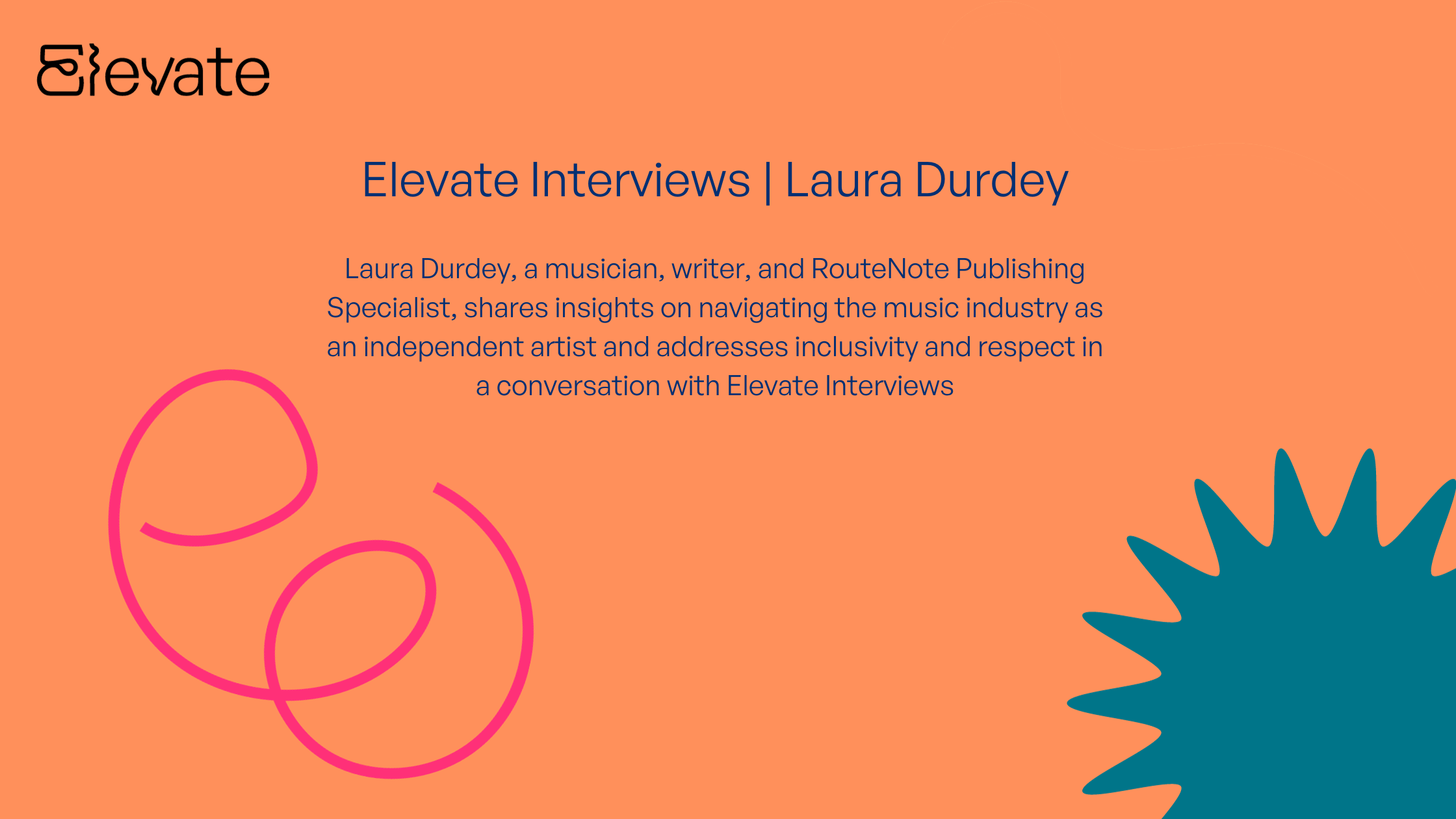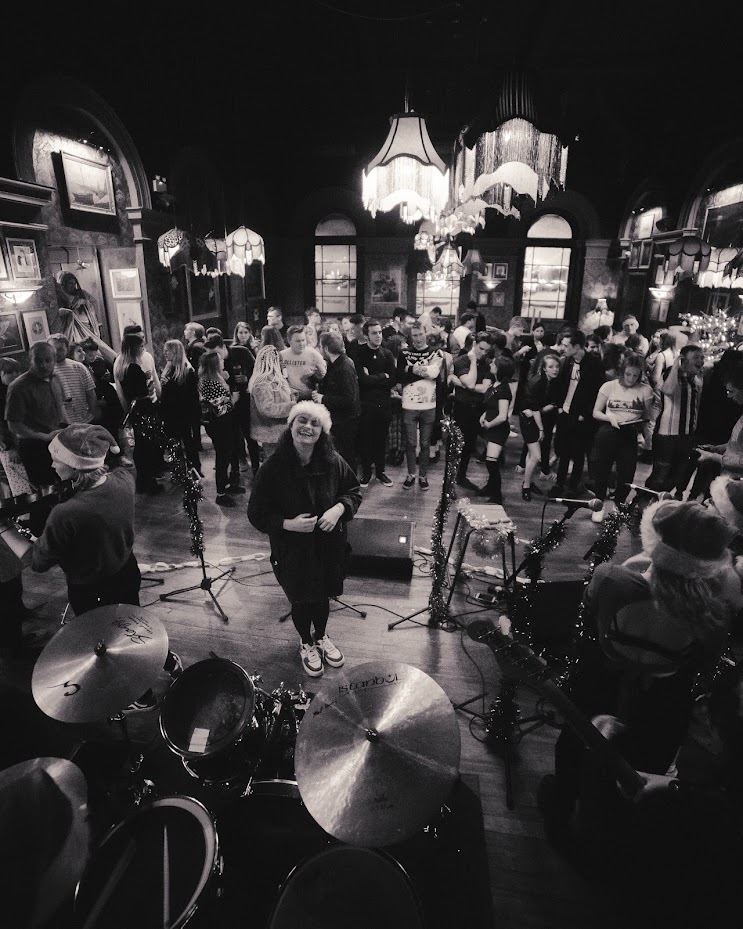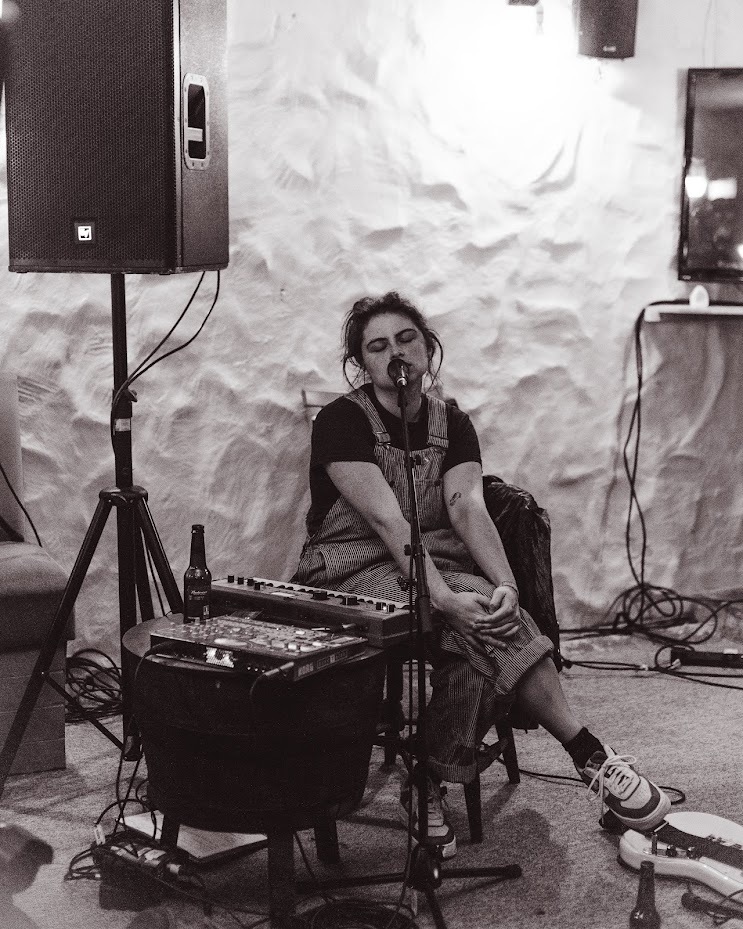Elevate Interviews | Laura Durdey
Musician, writer, and RouteNote Publishing powerhouse, Laura Durdey joins us in the latest edition of Elevate Interviews. In this discussion, Laura shares her own experiences as both an independent artist and someone who works within the music industry.

Whether you’re feeling a little alone in your experiences and are seeking validation, or you’re someone looking to educate yourself on what it’s like being a minority in a largely male-dominated industry, Laura Durdey has some fantastic observations to share.
Join us as we unpick the importance of recognising your own social echo chambers, whether anyone should have to behave or present a certain way in order to be respected in the music industry, plus a number of other pertinent points relating to inclusivity in the industry.
- Can you introduce yourself?
- How did you get started in music?
- What was studying music at university like?
- Do you have a favourite project you’ve worked on?
- What is a dream musical venture you would work on?
- Are there any other barriers preventing you from doing this?
- How do you feel about people identifying themselves as “women musicians”?
- What is your local music scene like?
- Is it different working with exclusively women and non-binary artists?
- How can we make safer spaces for women and non-binary producers and musicians?
- Have you experienced sexism whilst doing live performances?
- Do you worry about upsetting people by speaking up?
- Do you have any tips you’d give to women and non-binary people in music?
- How can companies in the music industry be more supportive of women and non-binary employees?
If you want to skip ahead, use the links below (but we recommend the whole read!)
Can you introduce yourself?
My name is Laura Durdey, and I work at RouteNote in the music publishing department.
As a musician as well, how did you get started and where has it taken you over time?
So, I started singing when I was very young. It started with karaoke in the local pub when I was about 6 years old. I used to sing Beatles songs, and that’s how I found out that I enjoyed music.
And then, from there, I began doing session work with multiple bands, backing singing for a 50s band and performing at festivals. That led to studying music at university, and finding out that I liked writing music as well.
What was your experience of studying music at university?
I enjoyed it. It’s a weird thing to study music, especially because it was a Popular Music course and music is very subjective. You’ve sometimes got to take every bit of criticism on your work with a pinch of salt because it’s not “for” everyone, what you do.
Do you have a favourite musical project that you’ve worked on?
My favourite project – there are probably two – I wrote a musical, which I never got to put on because of the pandemic (Covid-19). But, I wrote a musical in about five months. It had eight songs, and I notated all the parts. So, the trumpet, and the violin parts, worked with a big band for it, and actors to sing the songs. It was great.
It’s called Mundane the Musical, it’s literally about working in an office and the repetition of day-to-day life. So the musical starts and finishes the same.
We asked Laura if we’ll ever be treated to this musical… She gave a confident “maybe”.
I also worked on a project called The Christmas Collective, where I studied Christmas music and create four songs based on famous Christmas songs. I used similar chord progressions to famous Christmas songs, so people would immediately connect to them because no one likes new Christmas songs. They just want to hear the old ones.
If time and money were no object, what musical venture would you pursue?
I’d like to be able to fully produce and write music for myself, but I also really love to write music for other people. Like, I’d absolutely love to write songs for Eurovision.
I’d like to write for artists and for people. I’m really into the analysis of music and pop music, so it’d be fun to be able to write for lots of different artists, find their style, and sort of copy it and put it into their work. Which is why Eurovision would be great.
I’d love to write for a label as well. I like analysing music and then putting that into my own work. I think I write better music when I’m put into a theme or into a small box.
Do you think, besides time and money, there are any other barriers in the way of you pursuing this venture?
Well, being a woman, it’s a lot more difficult to be chosen for that sort of job role. There are very few women songwriters, women producers, and women musicians who are in the pop sphere. So, it’s very difficult to get in. Especially, even just performing as a female musician, it’s hard to be taken seriously if you’re not a certain shape or size, if you don’t look a certain way. It’s hard to get within that.
I’d say it’s changing, but very slowly. It’s the same thing as anyone who’s in the spotlight. When you think of back in the day for Hollywood, models, female musicians – they’ve always been a certain way. The male perception of beauty really plays into that as well. When you’re not considered as what is perceived to be beautiful for that decade, as it changes from decade to decade, when you’re not within that it’s definitely a lot more difficult for female musicians to gain any traction.
Ageism is a big thing as well. Every year that gets on, you feel like you’re one year further away from being a musician. When Carley Rae Jepson released Call Me Maybe, everyone was going on about how old she was because she was 26. And that she was “such an old pop star”.
But, that is changing. There are people like Self Esteem, who is in her mid-thirties, and she only started performing as Self Esteem when she was in her early thirties. So, it is changing, but there are only a few examples of it.
How do you feel about someone identifying themselves as a woman musician/performer or producer, as opposed to simply a musician/performer or producer?
It’s difficult because I feel like you should feel proud to be a female artist and musician, but then it also can box you out. I also think it shouldn’t matter what gender you are. It should just matter about your skill level as a performer and/or musician. So, you can see it both ways.
It depends on what you’re applying for, or putting yourself forward for. Festival lineups now are getting a lot more female-friendly. I went to 2000 Trees Festival at the weekend and I’d say 70% of the bands I saw were female-fronted. And it’s an alt-rock festival as well, and rock is very male-dominated. But it depends, I’m someone who’d always put themselves forward as an artist or performer, rather than a female artist or performer. But, that isn’t because I’m not proud to be female, but I feel like people have their own stereotypes in their heads about what a female artist or performer should sound like, and I don’t want to be put into that.
With music awards getting rid of gendered categories I think, in the grand scheme of things it is a good thing, but then they only put in male artists for it, so it’s not diverse. And it’s not like there aren’t enough female artist which are good enough to be nominated for these awards. It’s just, let’s be honest, mostly men who are choosing the artists to be put forward as nominees.
What is your local music scene like? What do you love about it, and what do you not love so much?
The music scene around Penryn and Falmouth (Cornwall, UK) is good, it changes quite consistently because it is a uni town. So a lot of it changes based on what the students at the uni are doing. Some parts of it are really good, it’s got a really good punk scene and a heavier scene. There are some really cool female-led punk groups about, like Dog Spit and F, emasculata, and others. They’re really good, really interesting.
I’d say there’s a lot of neo-soul stuff, which is good but it’s also a lot of white boys playing their instruments and wanking each other off. It seemed to come after the lockdown. It’s a lot of people who are very very good at their instruments, and jam bands, which I don’t hate, but it’s pretty unstructured and hard to enjoy. Plus there are hardly ever any women in those bands as well.
I tried to put on female jam nights at a local bar. The issue was women tend to not feel as confident playing their instruments. I feel like women feel like they need to prove themselves, and they don’t have the confidence to be able to practice exactly what it is they’re playing. Whereas I feel like a lot of men think they’re really good at their instruments, and can just get up and play. And I do it to myself as well. I don’t think I’m as good as I am, even when people tell me I am. In the end, I feel like women feel like they have to be a lot better than men to be recognised for their skills. If they’re not, they tend to be put down.
You get spoken to differently as a woman, especially at a jam night where you don’t know everyone and haven’t played with people before. Especially if you’re a female instrumentalist. If I get up and play the piano rather than sing, people always just assume you’re a singer rather than an instrumentalist… because women can’t play instruments with the men, they have to sing. In bands, people automatically assume I’m the singer, which is interesting.
Some of the female jam nights were good, but it was mostly just six people switching around instruments. Because we could all play multiple instruments, we’d all switch around and it was really good. But, when a few of them couldn’t make it, it sort of fell apart because there weren’t that many female drummers who wanted to do that or felt good enough to do that. There are not many female bassists that want to perform live and feel like they’re good enough to jam. Even though they are good enough. I wouldn’t consider myself the best guitarist, but I’ve got up and played the guitar at those jam nights. But it’s also because I’m leading them that I felt confident enough to do that. I’m not sure if I would if I was just someone who was sitting on the sidelines and watching.
The difference between the atmosphere at the female jam nights and the mixed ones – because I still run the jam nights monthly, they’re just mixed now – is women tend to let each other shine and they play together rather than against each other. A lot of the mixed-gender ones, which are predominantly men, don’t know when to play (or not to play). So there’s a lot of solos going over each other, no breaks, 20-minute-long songs. It’s a lot more about showing off than about playing well.
Have you noticed a difference between working on musical projects with women and non-binary artists, as opposed to with men?
Most of the projects I’ve been a part of have been fine, but that’s because they’ve been very mixed gender or it’s the people I’ve chosen to work with. There have been bands I’ve been a part of in which we’ve had people try out for guitar parts or bass parts, and we’ve let them go because they don’t know when to not play. Which has only ever happened with men.
But I’ve not had it so much within my personal bands, cos I make bands with friends. So I don’t have to vet people, like, are you not going to listen to me because I’m a woman leading this band? All of them do listen because they’re my friends and we have mutual respect for each other.
How do you think we can make safer and more inclusive spaces for women and non-binary producers and musicians? Can you name any that are achieving this?
I think the main thing that’s going to achieve that is time and awareness.
I don’t think any of that can be achieved by anyone doing anything in particular. For example, there’s Siren Studios in Penryn, which is a female and non-binary inclusive studio, which does allow men to use it, but prioritises women and people of diverse genders. But, they do have occasional hate coming to them from men for it… even though they could go and use any other studio.
I think the only thing is going to be time. because there are always going to be people fighting against it because they can’t walk in our shoes and they don’t understand what it is like to be a female in music or be segregated based on their gender.
Giving people proof that it is an issue will make a difference too. So if something happens, say you have a friend who is a musician who doesn’t think it’s an issue, it’ll be doing a gig with them and something sexist happens. Which does happen at most gigs. Then pointing it out and saying, “See that? Would they have said that to you? No?” It’s just proof and putting it in front of them. It’s something that you don’t notice unless it happens to you.
Have you experienced sexism whilst doing live performances at all?
There’s been sexist comments from the crowd, and vulgar comments based on how I’m performing or what I’m wearing. There’s general stuff like the sound person not speaking to me even if it’s my band, and deferring to the male in the band. That always happens. Also just carrying equipment. If I pick up my equipment from the gig, someone will come up and say “Let me take that from you, you can’t carry that”, but they’d never do that to a man.
It’s that sort of chivalry which is meant to be seen as helpful but it’s always towards women. Those are the classic examples that happen all the time.
It’s not something I experience as badly because I’m quite a dominating woman. If you’re someone who is more softly spoken or, to be honest, more feminine, it’s even more difficult.
Do you ever worry about upsetting people or saying the wrong thing if you speak up about gender inequality in the music industry?
No.
If people think I’m speaking up too loudly about it, or that I’m saying the wrong thing, they’re not really people I want to be listening to my music anyway. So, it doesn’t really matter to me.
Do you have any tips you’d give to women and non-binary people in music?
Yeah, especially when you’re gigging and dealing with sound technicians, it’s about going up to them first, rather than waiting for them to come over to you. Because, 8 times out of 10, they’re not going to come over to you, they’re going to come over to a male person in the band.
So it’s going over first and introducing yourself, cos if you introduce yourself first you’re likely to be the band leader.
And be sure of yourself. Even if you’re not. Being sure of yourself and expressing what you want. That’s pretty much it, that’s all you can do.
How do you feel companies in the music industry can be more supportive of women and non-binary people as employees?
Showing representation. Things like articles like this, stuff which show they care about sharing and voicing the opinions of the people who work there. As well as having women in higher-up roles in the company, and making sure the company isn’t just a boy’s club. That’s the main thing. It’s having the representation there and listening to their problems. having women in the big meetings, having them just under the CEO, or being the CEO. Having women that aren’t just in the grunt roles.
In terms of avoiding being seen as companies just jumping on the bandwagon, even this interview could be considered that. Because it’s in – it’s trendy right now. It’s keeping it up and not doing it to just be part of the hype, it’s keeping up the momentum so that it’s not just something that’s happening this year, it’s something that’s happening in 10 years’ time.
The last 10 years have been massive for women’s rights, in terms of how sexualised women were in the 00s.
Look for the RouteNote Elevate badge to learn more about gender diversity in music and discover some incredible diverse artists.


